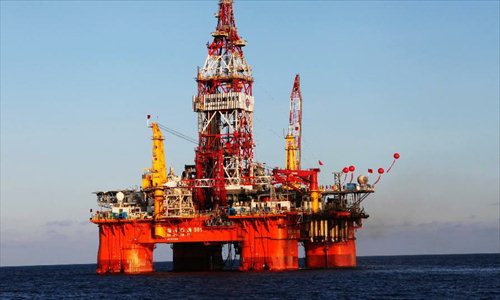China protests Vietnam riots

File photo shows the 981 drilling platform of China Oilfield Services Limited (COSL), 17 nautical miles (some 31 kilometers) from Zhongjian Island of China's Xisha Islands, south China sea. Photo: Xinhua
China Thursday lodged a solemn protest against Vietnam over the wave of riots against Chinese firms in the country triggered by disputes in the South China Sea, in which at least two Chinese nationals were killed and more than 100 injured.
The riots have spread to central Vietnam, after thousands of people smashed and looted foreign plants in industrial zones in the country's south Tuesday.
One casualty was caused in an overnight riot at an iron and steel complex in Ha Tinh Province, invested in by Taipei-based Formosa Plastics Group.
Formosa said hundreds of Vietnamese workers at its plant staged a strike first, but this quickly became violent. They began "attacking some Chinese mainland workers and damaged offices and equipment," it said in a statement, AFP reported.
China 19th Metallurgical Corporation (MCC19), a contractor for construction of the plant, was one of the worst hit companies.
"As we counted, the hospital has received 75 Chinese nationals, while the hospital says 101 are admitted," a high-ranking official with MCC19 was quoted by the Xinhua News Agency as saying.
The official said the Chinese victim died before reaching hospital, and around 10 others still remain unaccounted for.
Dang Quoc Khanh, a local official in the province, told state-run VTV that at least 149 people were injured, and police had arrested 76 people and opened an investigation.
Another worker from the Chinese mainland was found dead in a Taiwan-funded factory in southern Vietnam's Binh Duong Province, David Chen, former chairman of the Council of Taiwanese Chambers of Commerce in Vietnam's Binh Duong branch, told the Global Times.
A staff member of a Chinese business association in Hanoi told the Global Times that there have been around 90 Chinese people injured in riots as far as they know.
Reuters put the death toll higher. It quoted a doctor at a hospital in Ha Tinh as saying that five Vietnamese workers and 16 other people described as Chinese were killed on Wednesday night in rioting.
However, Vietnam's foreign ministry spokesperson Le Hai Binh only confirmed one death in Ha Tinh, and described media reports and accounts on social networking sites of higher casualties as "groundless," reported Reuters.
China's foreign minister Wang Yi Thursday night held a phone conversation with his Vietnamese counterpart Pham Binh Minh, denouncing the riots and lodging a solemn protest.
Wang said "Vietnam bears inescapable responsibility" for the rioters' attacks on Chinese firms and nationals, and demanded Hanoi to immediately stop the violence and protect the safety of Chinese nationals and firms. He also demanded an investigation into the violence and compensation for the losses of Chinese firms and citizens.
Minh said more than 1,000 suspects have been arrested, and Hanoi will severely punish those responsible.
The Chinese government has dispatched a work group to Vietnam.
The riots in Vietnam come in the wake of rising tensions between the two countries over territorial disputes in the South China Sea after Vietnam slammed a Chinese oil company's launch of an oil rig in the waters of the Xisha Islands.
"The rioters targeted Chinese people and rampaged any factories with Chinese characters on their signs," said the Chinese business association staff, adding that some Chinese companies are planning to withdraw from Vietnam.
The riots caused panic and horror and hundreds of Chinese nationals fled to neighboring countries or back to China.
Kirt Chantharith, Cambodian National Police spokesman, told Reuters that more than 600 Chinese people from Vietnam crossed at Bavet international checkpoint into Cambodia on Wednesday.
In addition to plants funded by companies from the Chinese mainland, Taiwanese-funded plants, which hire many mainland workers, were also attacked. Firms from South Korea and Singapore were also targeted.
According to Chen, there are around 1,000 Taiwanese companies in Binh Duong and over 200 have been attacked, with 11 factories burned.
"These rioters, riding motorcycles, forced the factories in industrial parks to stop operating first and then they rushed into the factory when the workers left, damaging equipment, robbing valuable things and burning the factories," said Chen, who suggested the rioters were well-organized.
Chen said the Vietnamese government promised to send police and troops to protect them, however, they did not actively prevent the attack on Tuesday and Wednesday.
"The police indulged the atrocity," said Chen, adding that the riots hurt investors like him and some of his friends are planning to withdraw investments from Vietnam.
Gao Fei, a professor with China Foreign Affairs University in Beijing, told the Global Times that the Chinese government could organize planes to take Chinese nationals back from Vietnam as a means of consular protection.
But Gao added, "It would be the last way to organize nationals to withdraw from Vietnam as it means we have lost confidence in the Vietnamese government's ability to protect our nationals."
According to AFP, Vietnamese Prime Minister Nguyen Tan Dung described the situation as "very serious" and said that, while the recent groundswell of patriotism was "the correct thing," instigators who broke the law would be punished, according to an official statement.
AFP quoted experts as saying that Hanoi, which usually tightly controls dissent, has allowed some public protests to go ahead recently as a means of expressing extreme discontent with Beijing.
Amid the rising tension, the People's Liberation Army Daily said Thursday the Chinese army denied rumors of troops along the China-Vietnam border entering third-degree combat readiness, the third highest in the four-tier defense alert system.
Newspaper headline: At least 2 dead, 100 injured in anti-Chinese violence